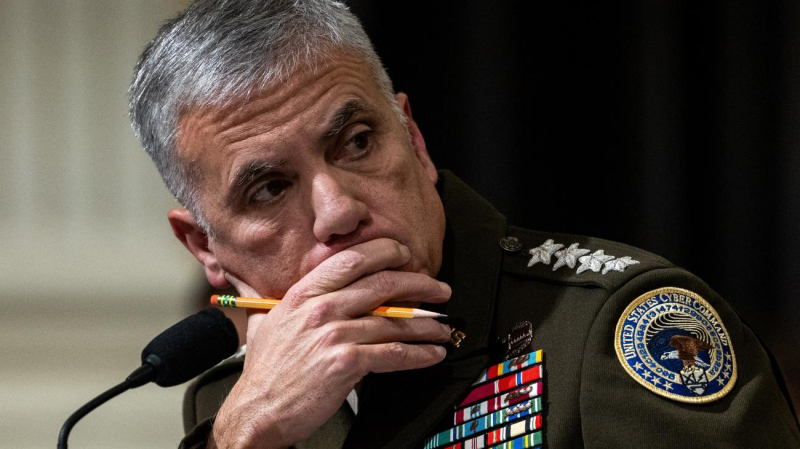
Nikhinson/AFP General Paul Nakasone
OpenAi, the company that publishes ChatGPT, a generative artificial intelligence tool, is continuing to strengthen its executive team, which began at the end of 2023 and the dismissal of Sam Altman, before his return some time later. After recruiting a former executive of the Gates Foundation and a lawyer from the Japanese multinational Sony, OpenAi announced last Thursday the highly controversial arrival on its board of directors of General Paul Nakasone, who recently retired after having been the director of the National Security Agency (NSA). The decision has sparked criticism and fears, as the figure of the NSA DG is closely linked to mass espionage.
In November 2023, OpenAi, which had been in hyper-growth mode for a year with the launch of ChatGPT, was experiencing a crisis. Its board of directors said it no longer had confidence in the leadership ability of Sam Altman, co-founder of the association with Elon Musk. Microsoft, which funded the company to the tune of $13 billion, announced his recruitment, but he received the support of almost all employees, including executives, who threatened to resign.
A manager of the “Censorship Industrial Complex” at OpenAi
Sam Altman returned a few days later. Last March, he was reinstated to the board of directors, which counts the firm co-founded by Bill Gates among its members. The board of directors said it had “full confidence” in his leadership, following the conclusions of an investigation into the crisis that occurred a few months earlier. OpenAi, which continued its emergence with the launch of GPT4 and partnerships with Apple through the launch of ChatGPT-Siri, then recruited many figures from the global tech sector to replace the leaders who had left.
Sam Altman then hired Sue Desmond-Hellmann, former CEO of the Gates Foundation, Nicole Seligman, former executive vice president of Sony, and Kevin Weil, former president of Planet Labs and former senior vice president at Twitter, Facebook and Instagram. On June 13, OpenAi hired Paul Nakasone.
The retired general is a former U.S. intelligence and cybersecurity leader. He served as commander of Cyber Command and then as director of the National Security Agency (NSA), before resigning earlier this year. He joins the board of directors as well as the new safety and security committee, which is tasked with protecting the firm from “increasingly sophisticated bad actors.” “Mr. Nakasone’s knowledge will also contribute to OpenAI’s efforts to better understand how AI can be used to strengthen cybersecurity by quickly detecting and responding to threats,” OpenAI explains.
His recent experience has focused primarily on “protecting US elections from foreign interference,” taking over the NSA in 2018 after accusations and investigations related to Russian interference in Donald Trump’s 2016 victory. A “fight against foreign interference” that has also served as a pretext for intelligence services, including the CIA and FBI, to set up the “censorship industrial complex,” revealed by the Twitter Files following the acquisition of the social network by billionaire Elon Musk. Musk.
ChatGPT, mass surveillance tool ?
Paul Nakasone has also been the subject of several controversies. In 2021, Republicans on the House Intelligence Committee withdrew their confidence in him for blocking a former GOP operative from becoming the NSA’s top lawyer. Former Fox News host Tucker Carlson has also accused the NSA of targeting his communications in order to “take him off the air,” but the agency has formally denied the accusations.
The appointment of the former NSA director has in any case raised ethical questions about mass surveillance, privacy and the use of AI, in an international context marked by the race to regulate this technology, whose power and rapid development are chilling.
The famous whistleblower, Edward Snowden, former employee of the CIA and the NSA, strongly criticized this appointment. He expressed concerns that this decision could be a “deliberate and calculated betrayal of the rights of every person on Earth”. Snowden fears that the integration of Nakasone could transform tools like ChatGPT into instruments of mass surveillance. “Never trust OpenAI or its products like ChatGPT and others,” he wrote.
There is cause for concern, especially since OpenAI, founded in 2015 as a non-profit association before transforming into a capped-profit company, could become a full-fledged company – to reap this shortfall that amounts to billions of dollars – in other words, in the same way as GAFAM, whose data management is the subject of several lawsuits.
READ ALSO
Open AI (ChatGPT) paves the way for “military” use of artificial intelligence ChatGPT's parent company, Open AI, quietly changed its rules of use earlier this month to open its doors to the defense sector. A change that… January 15, 2024 – 20:25 Society Generative AI and antitrust: European Commission examines Microsoft's investment in OpenAI TECH – Microsoft's investments in OpenAI, creator of ChatGPT, worry the European Commission. The EU competition watchdog wonders whether the i… January 10, 2024 – 12:50 Society Edward Snowden worries about our health data Systematic and massive analysis of health data is necessary to advance research and guide decision-making. This is all the more true in per… May 25, 2020 – 10:58 Society
You liked the article ? It mobilized our editorial staff, which lives only on your donations.
Information has a cost, especially since competition from subsidized editorial staff requires increased rigor and professionalism.
With your support, France-Soir will continue to offer its articles for free because we believe that everyone should have access to free and independent information to form their own opinion.
You are the sine qua non condition for our existence, support us so that France-Soir remains the French media which allows the most legitimate people to express themselves.

